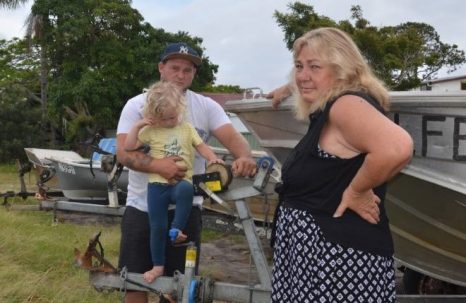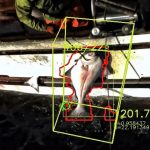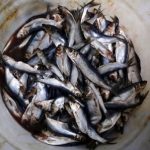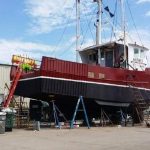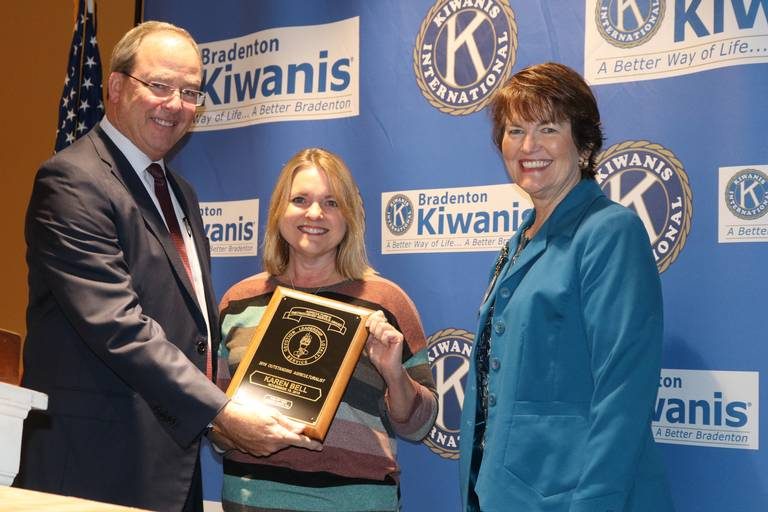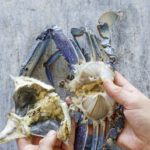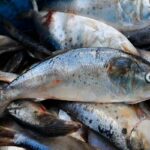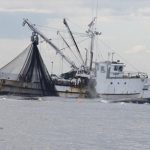Daily Archives: March 4, 2017
Questions raised about Coast Guard armed boarding
Pago Pago – 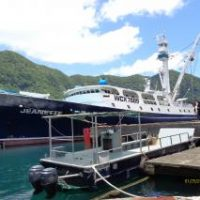 Some new information is emerging about the Coast Guard operation in which the purse seiner Jeanette was boarded by armed Coast Guard personnel at the main dock late last week, Bill Sardinha, whose company Sardinha & Cileu Management, provides services for the Jeanette said in an email to KHJ News, the Jeanette came into port on its own, and not ordered to return as we reported. He said a helicopter pilot on board has fallen ill and this required the vessel o return to Am Samoa for medical care Sardinha explained that the Jeanette was required to notify the US Coast in advance 96 hours, less if an emergency or if circumstance warrants exception, an illness qualifies. So the Coast Guard was well aware of its arrival. Sardinha reports that upon entering port on February 23rd, the Jeanette was surprised to find US government agents waiting to board the vessel with guns. He said the agents boarded the vessel, posted guards, isolated the crew and interrogated them for 12 hours. continue reading the story here 21:50
Some new information is emerging about the Coast Guard operation in which the purse seiner Jeanette was boarded by armed Coast Guard personnel at the main dock late last week, Bill Sardinha, whose company Sardinha & Cileu Management, provides services for the Jeanette said in an email to KHJ News, the Jeanette came into port on its own, and not ordered to return as we reported. He said a helicopter pilot on board has fallen ill and this required the vessel o return to Am Samoa for medical care Sardinha explained that the Jeanette was required to notify the US Coast in advance 96 hours, less if an emergency or if circumstance warrants exception, an illness qualifies. So the Coast Guard was well aware of its arrival. Sardinha reports that upon entering port on February 23rd, the Jeanette was surprised to find US government agents waiting to board the vessel with guns. He said the agents boarded the vessel, posted guards, isolated the crew and interrogated them for 12 hours. continue reading the story here 21:50
Dirty Secret Behind Wind Turbines, They Need Lots Of Oil
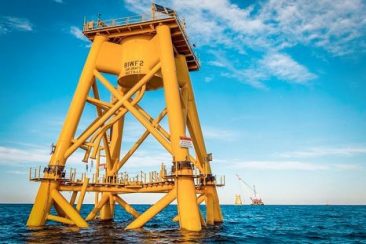 Offshore wind turbines may generate green energy, but they use a lot more oil than proponents like to admit. Just installing the foundation of a single offshore turbine can consume 18,857 barrels of marine fuel during construction, according to calculations published by Forbes Wednesday. Offshore wind farms often have over 100 wind turbines, meaning that building them requires almost 2 million barrels of fuel just to power the ships involved in construction. The Long Island-New York City Offshore Wind Collaborative will cost $1 billion dollar to build and generate roughly 200 megawatts of electricity, enough to provide power to between 40,000 and 64,000 homes — depending on how much the wind blows over the course of the year. continue reading the article here 19:39
Offshore wind turbines may generate green energy, but they use a lot more oil than proponents like to admit. Just installing the foundation of a single offshore turbine can consume 18,857 barrels of marine fuel during construction, according to calculations published by Forbes Wednesday. Offshore wind farms often have over 100 wind turbines, meaning that building them requires almost 2 million barrels of fuel just to power the ships involved in construction. The Long Island-New York City Offshore Wind Collaborative will cost $1 billion dollar to build and generate roughly 200 megawatts of electricity, enough to provide power to between 40,000 and 64,000 homes — depending on how much the wind blows over the course of the year. continue reading the article here 19:39
Lobstermen cheered! LePage removes lobster fee increase from proposed budget
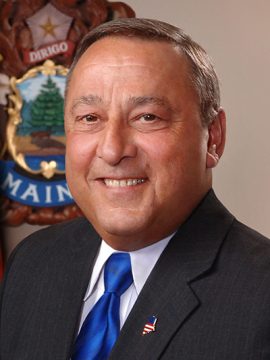 Lobstermen cheered Saturday when Gov. Paul LePage announced at the Maine Fishermen’s Forum that he was pulling an increase in the lobster fishing license fee out of his proposed state budget. The extra money was going to be used to fund new lobster research, new technology for state fisheries researchers and raises for Maine Marine Patrol officers, among other things.,, Under the proposed fee increases, a lobsterman with two deckhands would have paid $114 more a year for his license, bringing the cost of securing a license to more than $1,000 for the first time. Read the story here 16:47
Lobstermen cheered Saturday when Gov. Paul LePage announced at the Maine Fishermen’s Forum that he was pulling an increase in the lobster fishing license fee out of his proposed state budget. The extra money was going to be used to fund new lobster research, new technology for state fisheries researchers and raises for Maine Marine Patrol officers, among other things.,, Under the proposed fee increases, a lobsterman with two deckhands would have paid $114 more a year for his license, bringing the cost of securing a license to more than $1,000 for the first time. Read the story here 16:47
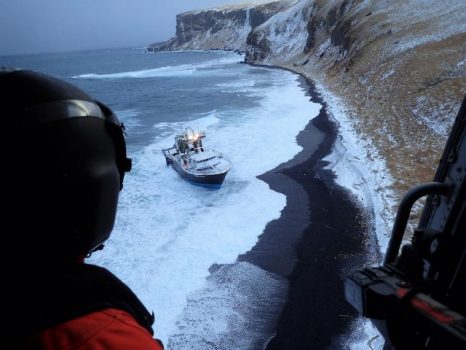
F/V Predator aground for more than two weeks
The grounded fishing vessel Predator remained on the beach in Akutan earlier this week. Salvage crews were attempting to re-float the boat. A large quantity of Pacific cod remains on board, while all the fuel has been removed. Resolve Magone Marine Service logistics coordinator David Maruszak, in Unalaska, said his company has been on the scene with about six salvage vessels for two weeks, but didn’t immediately try to pull the trawler free. An attempt on Monday to pull the boat free failed The re-float project had been underway for about a week, he said, they’re hoping for better luck in the next attempt. Earlier, he said Resolve removed about 5,000 gallons of fuel from the 93-foot-long vessel, homeported in Newport, Ore. Maruszak said the boat will require repairs before it resumes fishing, as several cracks have been noted in the hull, and that the next step once the boat is off the beach is for divers to conduct an underwater survey. Alaska Department of Fish and Game biologist Ethan Nichols in Unalaska said trawler was loaded with 300,000 pounds of Pacific cod, now unfit for human consumption. Read the article here 14:08 A side note! Tonight, I saw a photo of the vessel afloat. They got her off the beach. We will be looking for updates. 20:52
Alaska Crab fishery faces identity crisis, while Fishermen have a tough time finding snow crab
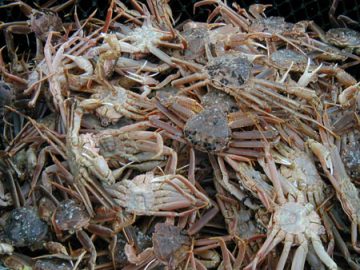 Fishermen are having the toughest time in the past five years finding snow crab, according to the Alaska Department of Fish and Game, in Unalaska. The fleet of 60 crab boats had caught 16. 6 million pounds, for 74 percent of the quota in the Bering Sea, ADF&G biologist Ethan Nichols in Unalaska said Monday. But based on the number of crab in an average pot, the catch has plummeted from a peak of 237 to 116 in the most recent weekly tally, he said. The average weight is 1.3 pounds per individual snow crab, he said. continue reading the story here – Crab fishery faces identity crisis. Is it a bairdi Tanner or is it an opilio Tanner snow crab? Or is it something in between, a hybrid? The Bering Sea commercial crab fishery is facing an issue fundamental to identity, and in what fishery which crustaceans can legally appear. In this issue, it’s up to the Alaska Board of Fisheries. Crabbers and their allies in the Pribilof Islands say a hybrid should be considered part of the catch of whatever the fishermen are targeting, whether Tanner bairdi or Tanner opilio. While both have Tanner in their names, the bairdi are commonly known as Tanners, while the typically smaller opilio are called snow crab. continue reading the story here 12:10
Fishermen are having the toughest time in the past five years finding snow crab, according to the Alaska Department of Fish and Game, in Unalaska. The fleet of 60 crab boats had caught 16. 6 million pounds, for 74 percent of the quota in the Bering Sea, ADF&G biologist Ethan Nichols in Unalaska said Monday. But based on the number of crab in an average pot, the catch has plummeted from a peak of 237 to 116 in the most recent weekly tally, he said. The average weight is 1.3 pounds per individual snow crab, he said. continue reading the story here – Crab fishery faces identity crisis. Is it a bairdi Tanner or is it an opilio Tanner snow crab? Or is it something in between, a hybrid? The Bering Sea commercial crab fishery is facing an issue fundamental to identity, and in what fishery which crustaceans can legally appear. In this issue, it’s up to the Alaska Board of Fisheries. Crabbers and their allies in the Pribilof Islands say a hybrid should be considered part of the catch of whatever the fishermen are targeting, whether Tanner bairdi or Tanner opilio. While both have Tanner in their names, the bairdi are commonly known as Tanners, while the typically smaller opilio are called snow crab. continue reading the story here 12:10
At the Maine Fishermen’s Forum: Lobstermen work with state on new penalties for violations
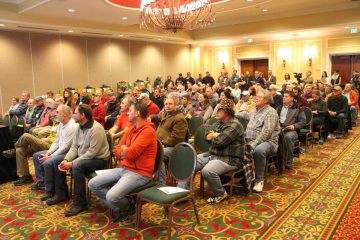 Enforcement of marine resource laws was the top concern when lobstermen met with state regulators March 3 at the Maine Fishermen’s Forum. Maine Department of Marine Resources Commissioner Patrick Keliher and Col. Jon Cornish of the Maine Marine Patrol met with the Maine Lobstermen’s Association in a packed meeting room at the Samoset Resort to talk about the state’s efforts to improve enforcement of marine resource laws. “You guys don’t agree on much,” moderator Patrice McCarron of the Maine Lobstermen’s Association said, earning a laugh from the gathered fishermen. She said the common ground the fishermen had found was their concern about violations. “Lobstermen deserve to work on a level playing field,” she said, but violations make that field unfair, and there was concern the penalties have not been severe enough to deter illegal activity. Work had begun long before the forum with a survey of lobstermen in the association and throughout the fishing industry to see what their top priorities were in terms of enforcement. The results of that survey led to a bill going before the Maine Legislature to improve the state’s lobster laws. continue reading the story here 10:08
Enforcement of marine resource laws was the top concern when lobstermen met with state regulators March 3 at the Maine Fishermen’s Forum. Maine Department of Marine Resources Commissioner Patrick Keliher and Col. Jon Cornish of the Maine Marine Patrol met with the Maine Lobstermen’s Association in a packed meeting room at the Samoset Resort to talk about the state’s efforts to improve enforcement of marine resource laws. “You guys don’t agree on much,” moderator Patrice McCarron of the Maine Lobstermen’s Association said, earning a laugh from the gathered fishermen. She said the common ground the fishermen had found was their concern about violations. “Lobstermen deserve to work on a level playing field,” she said, but violations make that field unfair, and there was concern the penalties have not been severe enough to deter illegal activity. Work had begun long before the forum with a survey of lobstermen in the association and throughout the fishing industry to see what their top priorities were in terms of enforcement. The results of that survey led to a bill going before the Maine Legislature to improve the state’s lobster laws. continue reading the story here 10:08
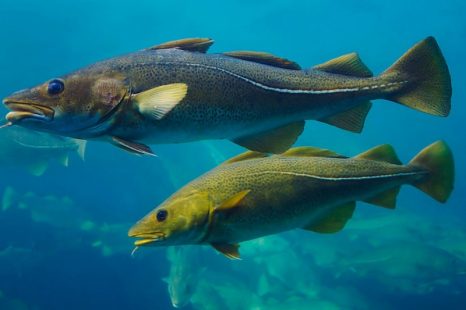
Editorial: Catch-22
Some problems aren’t meant to be solved — at least, not by us. Earlier this week, we ran an editorial (“Sea change,” March 1) about the declines in both the shrimp and crab biomass — and the inevitable problem that is going to create for both fish harvesters and for rural parts of this province that depend on fishing and processing either of those species. Simply put, those communities and workers don’t have options. Part of the editorial talked about the fact that cod are natural predators of shrimp and crab and recovering cod populations are, no pun intended, taking a bite out of those populations. (Warmer ocean temperatures, a product of increased global temperatures, also aren’t helping; higher temperatures are good for cod, but bad, for example, for shrimp.) The editorial said this: “(As) tragic as it sounds, the long-hoped-for return of the cod might be a big part of the problem — because shrimp and crab are prey for codfish.” In retrospect, “problem” might not have been the right word. continue reading the editorial here 09:32
Commercial longline seasons to open March 11th, on time
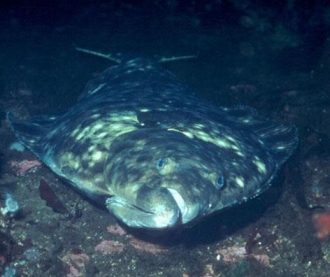 Commercial longliners in Alaska can go fishing on March 11 after all. The National Marine Fisheries Service announced Friday. March 3 that March 11th will be the start date for halibut and black cod fishing. March 11th is the halibut fishing start date approved by the International Pacific Halibut Commission back in January. The National Marine Fisheries Service typically opens long-line fishing for black cod on the same day. President Trump issued an executive order in January requiring that for every one new regulation issued, at least two prior regulations be identified for elimination. The start dates, catch share plan and other changes are all regulations that need to be published in the federal register. As of late last month, the National Marine Fisheries Service was still unsure of the impact of the presidential order on the fisheries. Fishermen in Alaska were questioning whether they’d be able to start fishing on that date. However, the federal agency confirmed Friday that the season would be starting on the 11th for both halibut and black cod. Read the rest here 08:52
Commercial longliners in Alaska can go fishing on March 11 after all. The National Marine Fisheries Service announced Friday. March 3 that March 11th will be the start date for halibut and black cod fishing. March 11th is the halibut fishing start date approved by the International Pacific Halibut Commission back in January. The National Marine Fisheries Service typically opens long-line fishing for black cod on the same day. President Trump issued an executive order in January requiring that for every one new regulation issued, at least two prior regulations be identified for elimination. The start dates, catch share plan and other changes are all regulations that need to be published in the federal register. As of late last month, the National Marine Fisheries Service was still unsure of the impact of the presidential order on the fisheries. Fishermen in Alaska were questioning whether they’d be able to start fishing on that date. However, the federal agency confirmed Friday that the season would be starting on the 11th for both halibut and black cod. Read the rest here 08:52
Controversy brewing over snapper-grouper Exempted Fishing Permit
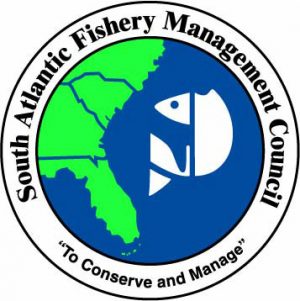 A storm is brewing in the South Atlantic region, a storm of controversy over snapper-grouper fisheries access and allocation. A group of four commercial fishing businesses – the South Atlantic Commercial Fishing Collaborative – filed an Exempted Fishing Permit (EFP) application with the National Marine Fisheries Service on Feb. 6. If approved by NMFS, the EFP would allow a group of 25 snapper-grouper boats operated by the four businesses to harvest blueline tilefish, gag grouper, gray triggerfish, greater amberjack, vermilion snapper and species in the jacks complex for two years (2018-19) in a pilot program while being exempt from numerous fishing regulations. The generic name for such a fisheries management method is catch shares, which, according to NOAA Fisheries, is a program in which “a portion of the catch for a species is allocated to individual fishermen or groups. Each holder of a catch share must stop fishing when his/her specific share of the quota is reached.” But it is a concept the huge majority of saltwater fishermen – recreational fishermen and small commercial fishing operations – have proven to be vehemently opposed to. continue reading the story here 08:12
A storm is brewing in the South Atlantic region, a storm of controversy over snapper-grouper fisheries access and allocation. A group of four commercial fishing businesses – the South Atlantic Commercial Fishing Collaborative – filed an Exempted Fishing Permit (EFP) application with the National Marine Fisheries Service on Feb. 6. If approved by NMFS, the EFP would allow a group of 25 snapper-grouper boats operated by the four businesses to harvest blueline tilefish, gag grouper, gray triggerfish, greater amberjack, vermilion snapper and species in the jacks complex for two years (2018-19) in a pilot program while being exempt from numerous fishing regulations. The generic name for such a fisheries management method is catch shares, which, according to NOAA Fisheries, is a program in which “a portion of the catch for a species is allocated to individual fishermen or groups. Each holder of a catch share must stop fishing when his/her specific share of the quota is reached.” But it is a concept the huge majority of saltwater fishermen – recreational fishermen and small commercial fishing operations – have proven to be vehemently opposed to. continue reading the story here 08:12







